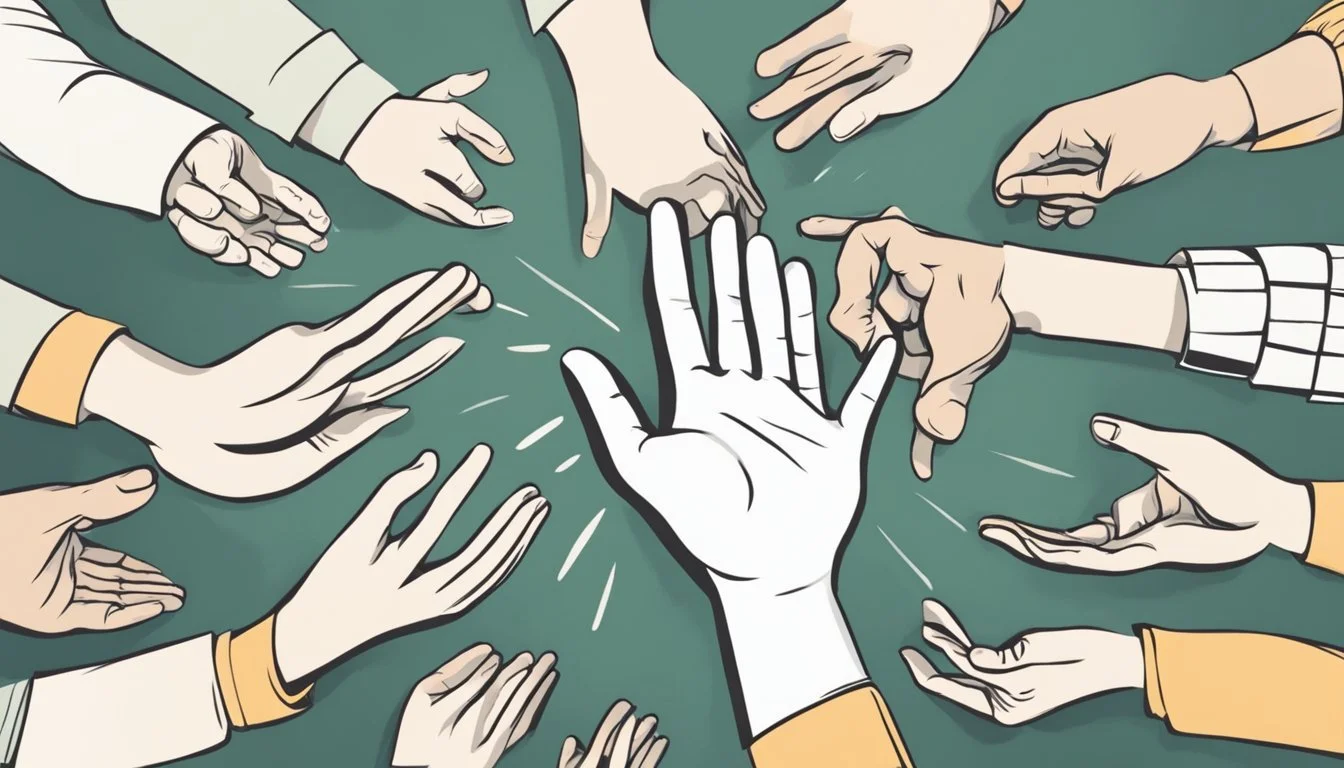5 Strategies for Handling a Friend Who's Always Asking for Favors
Practical Tips for Maintaining Balance
Friendship is built on mutual understanding and support, yet sometimes the balance can tip when one friend consistently asks for favors. This can lead to feelings of being taken advantage of and can strain the relationship.
It's essential to recognize when this pattern emerges and to develop strategies for handling such situations. This article will explore effective ways to maintain the integrity of your friendship while managing expectations and boundaries.
1) Set Boundaries Early
Establishing boundaries early in any friendship is crucial. This sets clear expectations and helps avoid misunderstandings later on. Friends should know what behaviors are acceptable and which are not.
Communicate these boundaries directly and kindly. Using "I" statements can help make the conversation feel less confrontational. For example, saying "I need some time to myself" rather than "You are always asking too much."
It's important to be consistent. Once boundaries are set, sticking to them reinforces their importance. This reduces the chance of friends overstepping or feeling confused about what is acceptable.
If a friend reacts negatively, listen to their concerns but remain firm. Hearing them out shows respect for their feelings, but it’s important not to back down from established boundaries. This ensures mutual respect and understanding in the friendship.
Acknowledge positive behavior when friends respect the set boundaries. This reinforces the boundaries and encourages continued respectful behavior. Simple gestures like saying "Thank you for understanding" can go a long way.
Being clear and consistent from the beginning can prevent conflicts later. It lays a foundation for a healthy and respectful friendship.
2) Suggest Alternatives to Help
Sometimes, friends may not realize the burden they place on others by constantly asking for favors. One effective strategy is to suggest practical alternatives.
For instance, if a friend frequently asks for rides, propose carpooling or suggest public transport options. This can ease the load while still offering helpful solutions.
If they often seek financial help, direct them to budgeting apps or financial counseling services. These resources can teach them to manage their funds better without relying on others.
Another approach is to encourage them to develop new skills. If they ask for help with tasks, suggest online tutorials or workshops where they can learn to complete these tasks independently.
Providing information on community resources can also be beneficial. Inform them about after-school programs, support groups, or volunteer organizations that can assist with their needs.
These suggestions not only address their immediate needs but also empower them to find long-term solutions. Offering alternatives shows that you care about their well-being while maintaining healthy boundaries.
3) Share Resources for Self-improvement
One way to help a friend who's always asking for favors is to share valuable resources for self-improvement. Providing these tools can empower them to be more self-sufficient and less reliant on others.
Encourage them to explore books on personal development. Titles such as "Atomic Habits" by James Clear can offer practical advice on forming better habits and achieving goals.
You might also suggest they listen to motivational podcasts. Programs like "The Tim Ferriss Show" or "The Tony Robbins Podcast" feature interviews and tips from successful people across various fields.
Directing them to online courses can also be helpful. Platforms like Coursera or Udemy offer courses in everything from time management to financial literacy. These can provide the skills they need to handle their affairs more independently.
Additionally, recommend they engage in mindfulness or meditation apps. Apps such as Headspace or Calm can assist in reducing stress and improving mental clarity, which can lead to better decision-making and self-reliance.
Finally, sharing articles from reputable websites like Psych Central can offer insights into self-esteem and personal growth. This can help them understand the importance of building a stronger, more independent mindset.
4) Prioritize Your Own Needs
It's essential to acknowledge your own needs and ensure they are met. When a friend constantly asks for favors, it can be easy to put their needs ahead of yours. To maintain a healthy balance, he should regularly check in with himself to understand what he needs.
Setting limits is vital. By clearly defining what he is comfortable with, he helps foster a mutual respect in the relationship. This prevents feelings of resentment from building up over time.
He should make self-care a priority. Engaging in activities that rejuvenate and energize him ensures that he doesn't feel depleted. Rest and relaxation are just as important as helping others.
Communicating openly about his limits can be beneficial. Letting his friend know that he has other commitments and responsibilities helps establish clear boundaries. This can also educate the friend about respecting his time and energy.
Learning to say no is a valuable skill. It’s not about refusing every request but ensuring the requests align with his capacity and willingness. Politely declining when necessary ensures he isn't overburdened.
5) Communicate Openly and Honestly
Honest communication is key in any friendship. Addressing your friend directly and respectfully can help set clear boundaries. Explain your feelings and how their constant requests impact you.
Using "I" statements can make your message more personal and less accusatory. For example, say, "I feel overwhelmed when I'm constantly asked for favors," instead of, "You always ask for things."
Active listening is crucial. Make sure to listen to your friend's perspective and respond thoughtfully. This shows respect and can help both parties understand each other better.
Empathy is an important aspect of communication. Acknowledge your friend's feelings and needs while expressing your own. This balance can help maintain the friendship while setting necessary limits.
Ensure that the conversation remains constructive. Avoid blame and focus on finding a mutual understanding. This approach can foster a healthier and more balanced relationship.
Understanding The Situation
Handling a friend's constant requests for favors requires understanding why they ask for help and recognizing the patterns in their behavior. This knowledge helps in addressing the situation effectively.
Why Friends Ask for Favors
Friends may ask for favors for various reasons. Sometimes, they genuinely need help. They might be facing difficulties and see their friends as a reliable support system. Other times, they might not realize the frequency of their requests, viewing them as simple, infrequent asks that don’t impose heavily.
At times, asking for favors can stem from personality traits. Some individuals are naturally more inclined to seek help due to insecurity or lack of confidence. They might feel more comfortable reaching out rather than solving problems independently. Understanding these motivations can make it easier to address the root cause of their behavior.
Recognizing Patterns
Identifying patterns in a friend's behavior is crucial. Look for repeated behaviors such as always needing help with similar tasks or recurring requests at certain times. This can be indicative of deeper issues such as poor time management or dependency. These patterns can highlight whether the favors are occasional needs or habitual tendencies.
Pay attention to how the friend reacts when a request is denied. If they become upset or persistently push the issue, it may indicate an entitlement mentality. On the other hand, if they accept the refusal gracefully, it suggests they are more considerate and perhaps unaware of how frequently they are asking for help. Recognizing these patterns can guide the approach in addressing and managing the situation better.
Setting Boundaries
Establishing and communicating clear boundaries is essential when dealing with a friend who frequently asks for favors. Effective boundaries protect personal well-being and maintain healthy relationships.
The Importance of Boundaries
Boundaries help maintain a balance in relationships by clearly defining acceptable behaviors. Without them, one might feel overwhelmed or taken advantage of. Consistently enforcing boundaries also promotes mutual respect.
Healthy boundaries prevent resentment. If a friend regularly requests favors without reciprocating, frustration can build. Clearly set limits ensure that both parties understand each other’s limits and commitments.
Boundaries also safeguard personal time and resources. By saying "no" when necessary, it ensures one’s own needs are met without feeling guilty or pressured.
How to Communicate Boundaries Effectively
Be direct and concise when setting boundaries. Avoid lengthy explanations as they can dilute the message. Clearly state what is acceptable and what is not, using "I" statements to express feelings without appearing accusatory.
Consistency is key. Reinforce boundaries each time they are tested, to ensure they are respected. Use specific examples to illustrate when a boundary is crossed, and communicate needs clearly.
Show appreciation when the friend respects boundaries. Positive reinforcement can encourage continued respect. Remember to be firm yet kind, maintaining the friendship’s integrity while safeguarding personal limits.
For example, say, "I can't help you this weekend because I need personal time." This approach protects one’s own needs while maintaining clear communication. This method is recommended by experts like those from Verywell Mind and SocialSelf, who emphasize the importance of clear, kind communication.
Setting boundaries is a crucial step in handling a friend who frequently asks for favors, ensuring that personal needs and relationships remain balanced and healthy.



